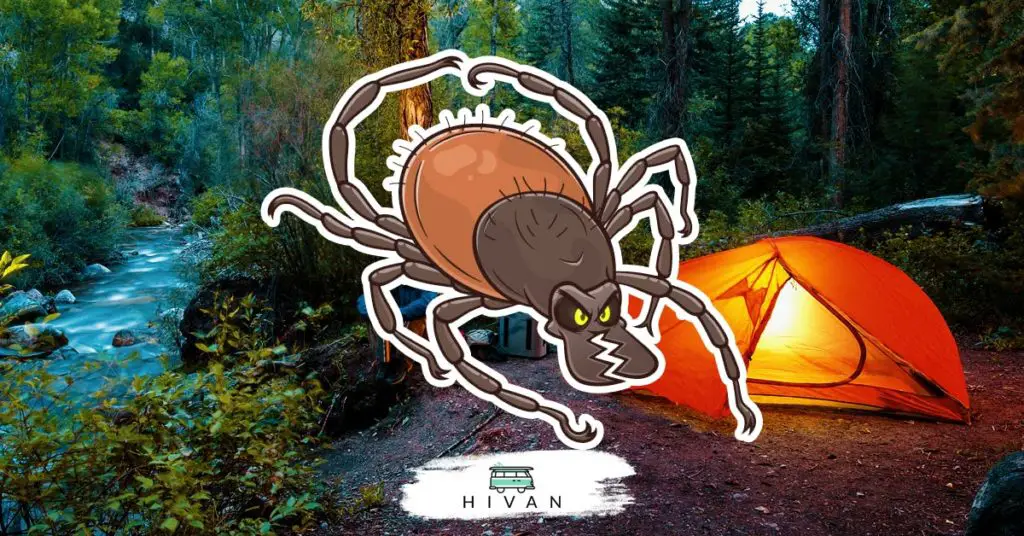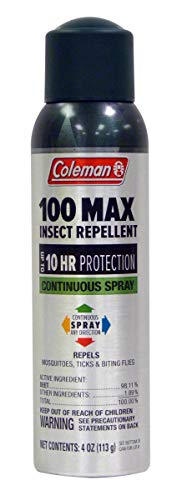Hi-van is supported by its audience. When you purchase using our links, we may earn an affiliate commission (no added cost to you). Learn more
Outdoor camping is a fun way to enjoy the sights and sounds of nature. However, insects like ticks can ruin the experience if they get into the tent and bite anyone in your entourage. Can ticks get through tent walls?

Ticks can’t get through tent walls because most tent walls are made of nylon, PVC, and polyester. They aren’t equipped with the morphology required to chew through such materials. These bugs can only make their way into the tent through holes in the wall or if you’ve brought them in mistakenly.
The rest of the article will cover all you need to know about ticks and your tent. You’ll also learn top tips to make sure ticks never get in as you enjoy your time outdoors.
Reasons Ticks Can’t Get Through Tent Walls
Like other insects that live off a live host, ticks aren’t equipped with the biological structure required to chew through a tent wall made of nylon, PVC, or polyester. They also can’t chew through the mesh installed in some tents.
These insects are only equipped to bite through animal or human skin. An insect will need powerful claws or teeth to bite through the material used in making most tents, and ticks don’t have any of these.
Therefore, they rely on openings in the tent to crawl in. The spaces between zippers and flaps, unplugged holes in the wall, and spaces between the tent floor and the ground are possible tick entry points you have to be more worried about.
Why You Should Keep Ticks Out of Your Tent
Tick bites are typically harmless to a healthy individual. However, several diseases can be passed to humans and animals through the bite of some tick species — Lyme disease is the most popular. The organism responsible for the disease, known as Borrelia burgdorferi, is transmitted by black-legged ticks.
Other common diseases caused by ticks include:
- Anaplasmosis
- Q fever
- Rocky Mountain spotted fever
- Tularemia
- Relapsing fever
Some types of ticks release toxins that can lead to temporary paralysis.
Only a small fraction of ticks carry the disease, but with the possible diseases they can cause, it’s best to keep out all ticks to prevent possible health problems. Even in cases where the tick doesn’t carry any disease, allergic reactions from the bite can be debilitating for immunosuppressed humans.
How To Keep Ticks Away From Your Tent
Now that you know that ticks can’t get through walls directly, you have to plug other possible entry points into your tent. Here are some tips you can work with:
Plan Your Trip To Avoid Ticks
When you’re planning for some time outdoors in your tent, you should exercise more caution during the peak summer months of April through September. Ticks are most active around this period.
Pick a campsite that doesn’t have any tick alerts and avoid those with tick warnings. You can find all the information you need on the camp or park website. If there are tick warnings everywhere you’d like to go, follow their advice on the best places to camp.
Pack Anti-Tick Supplies
Anti-tick supplies you should pack include:
- Rubbing alcohol
- Camping chairs
- Pointed tweezers
- Lint roller/duct tape
As you’ll see further down this article, these materials are useful in keeping out ticks or fighting them.
Stay Away From the Grass
Ticks love moist and humid environments such as those presented by leaf litter and long grass. Always walk on cleared trails and avoid brushing against the grass or shrubs to avoid picking up ticks. Similarly, when it’s time to sit down, don’t sit on the grass. Look for designated benches or grab your camping chairs.
Set Your Tent Carefully
When setting up your tent, you need to camp in a clear and dry area. Dark and wooded areas with piles of leaf litter are likely to harbor ticks. Similarly, you should avoid direct contact with the grass while in the tent. Use your camping chairs and place your beddings on a thick blanket.
Dress To Fight Off Ticks
Wearing long clothing that covers your arms and legs is one of the best ways to keep out ticks. Tuck the clothes in where possible to make it harder for the tick to find exposed skin.
Tuck your shirt into your pants, and tuck your pants into your socks. Your pants may not stay in the socks, so keep duct tape on hand. You should also wear light-colored clothes. They’ll help you stay cool while making it easy to spot ticks.
Don’t forget to protect your hair. Wear a hat to cover your hair properly and ensure your long hair is braided or tied up.
Treat Your Tent and Supplies With Permethrin
The tick repellant kills them on contact, so treating your tent with the chemical will ensure every tick that comes close will die instantly. The chemical is odorless and doesn’t harm humans. Some stores sell boots, clothes, tents, and other supplies already pre-treated with the chemical, so you can buy these instead of using the chemical yourself.
Bug repellent spray contains 100% DEET for strong protection against ticks, mosquitoes, chiggers, biting flies, gnats, fleas, and flies.
Permethrin shouldn’t be applied directly to the skin. Instead, you should use insect repellent containing DEET. An option such as the Coleman Insect Repellent Spray (available on Amazon.com) is a good product you can get here. It offers up to 10 hours of protection and can withstand perspiration.
If you don’t want to use chemicals, you can get some essential oils with tick repellent properties. Citronella, lemongrass, and peppermint are some examples.
Stay Clean and Vigilant
You should also check your body for ticks if you’re in an area with a tick warning. Use a mirror and check yourself every couple of hours. Showering within an hour of coming back from outdoors and keeping your outdoor clothes outside the tent can also help you avoid bringing ticks into your tent.
Related Articles: How To Keep Sand, Dirt, and Mud Out of a Tent Should You Keep Camp Food in Your Tent?
Final Thoughts
Ticks can’t make their way through a tent wall. When you find ticks inside your tent, you may have mounted your tent on an infested area, or you’ve brought them in from outside.
By taking the steps we’ve outlined above, you can keep your tent tick-free and avoid all the diseases they can potentially cause for you and your pets.

